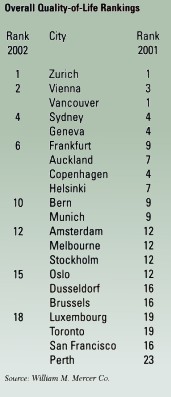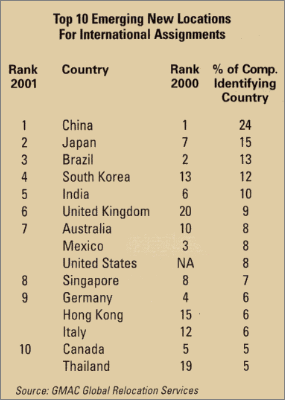
Top Quality of Life Survey
The 2002 worldwide quality-of-life survey conducted by human resources firm William M. Mercer has found Zurich, Switzerland to be the best overall place to live in the world, trailed closely by Vienna, Austria, and former No. 1 city Vancouver, British Columbia.
The analysis, conducted to assist multinational companies in assessing international hardship allowances for their expatriate workers, was based on an evaluation of 39 quality-of-life criteria. Cities in Europe, Australia and New Zealand continue to dominate the top of the table with Sydney and Geneva sharing fourth place, and Auckland, Frankfurt, Copenhagen and Helsinki being ranked sixth.
“Though the world’s living standards have risen slightly since last year, the gap between the cities at the top and bottom of the table is still large,” said Slagin Parakatil, senior researcher at Mercer. “The basic comforts of life, hygiene and personal safety are the main differentiators, and these are often lacking in the developing countries. The gap is magnified by economic and political instability.”
in Europe, North America and Japan
While quality of life is often touted as paramount, a simultaneously released report from KPMG looks at the make-or-break realities of what might be termed “quality of enterprise.”
The fourth edition of “Competitive Alternatives” compares business costs in 115 cities across Japan, North America and six countries in Europe. Looking at 27 cost components involved in the after-tax cost of startup and operation for 12 specific types of business over a 10-year time horizon, the report found that Canada, with a 14.5-percent advantage over the United States, ranked first as the overall cost leader. (For details about Canada’s cost leading categories, see the Canada 2002 supplement in this issue of Site Selection.)
The United Kingdom, boosted by a top ranking in low-cost manufacturing (including the leading position in pharmaceuticals and automotive) and in overall corporate income tax rates, ranked second. Italy ranked third, having dramatically improved its position due to significant reductions in employer costs for statutory employee benefits. Italy also showed the largest decrease in overall manufacturing cost indices, at 12 percent. Japan had the highest business cost structure, just as it did when the study was last performed in 1999. All Euro currency countries have improved their competitiveness because of that currency’s 24 percent decline against the U.S. dollar. European countries have also benefited from both decreased utility and telecom costs and significant corporate tax reductions.
Glenn Mair, who co-authored the report with MMK Consulting colleague Stuart MacKay and KPMG senior consultant Darren Byers, says the relative slip in competitive stature by the U. S. was the most interesting finding, due in large part to the drop in value of the euro since its introduction in 1999.
“This obviously is the result of an excellent business climate in the U.S. at this point, even though things are a little tighter right now,” Mair says. “As things start to pick up after 9/11, the US will continue to be a very attractive place for further investment, but the potential risk is if the dollar continues to gain strength against other world currencies, the U.S. becomes more expensive as an option as a way to do business, and overseas locations become cheaper.”
Mair cited financial crises in Germany and Japan as recent historical examples of what happens when a currency grows too strong, and costs fall out of line with the rest of the world.
Among other interesting findings, industrial land was least expensive in France, and Austria and Italy offered the lowest lease rates for suburban office space. The Netherlands, new to the study and supported by basic geography, has the lowest transportation costs-to-market. The five most competitive cities in continental Europe were Italian communities, while the top five spots in North America belonged to Canadian cities, followed by Lexington, Ky. as the top-ranking U.S. city.
Austria had the lowest property tax burden, for both owned and leased property, followed by the Netherlands. Those two countries also scored highest in the capital tax category, primarily because they are not assessed per annum, but when capital injections are made. The combined corporate tax burden on non-manufacturing operations is lowest in Canada, the UK, France and the U.S., primarily because of aggressive tax credit programs for R&D activity.
As for the skilled labor availability factor, Austria led the way, followed by Japan and the United States. Canada ranked fourth in skilled labor availability, but that ranking may be boosted by recently released Canadian census figures, which show that the population of 30 million has increased 4 percent over the past five years, largely due to immigration.
Mair says people from 35 different countries have studied the report at his consultancy’s Web site in the brief time since its release, delivering 210,000 hits. Asked what he would like to see covered the next time around, he says he would like to recover from this one first, but has plenty of ideas.
“Certainly areas of interest for us include Taiwan and Korea,” he says. “Another issue we’d like to address is comparison against Mexico. The issue there is that the basis of the study is looking at an identical facility in each location, and there is plenty of evidence to show that you don’t build an identical facility in Mexico as you do in the rest of North America if you want to be successful. You have to allow for differences in labor, work ethic and infrastructure, so that is a more complex issue, but one we’d like to take a look at if the opportunity presents itself.”
For full details, go to www.CompetitiveAlternatives.com

The eighth annual Global Relocation Trends Survey conducted by GMAC Global Relocation Services, in partnership with the National Foreign Trade Council and SHRM Global, found that only 26 percent of responding companies had an increase in expatriate employees during 2001, compared to 43 percent in 2000.
Of the 150 global companies surveyed, only 23 percent planned to increase the number of expatriates in 2002, compared to 58 percent who planned to do so in 2001.
“In addition to the challenges presented by September 11, the world was already experiencing financial pressures that were leading to a prudent approach to global expansion,” said E. James Simon, president of GMAC Global Relocation Services, when the survey was released. But the finding that 44 percent of revenue for the companies came from outside the headquarters country prompted him to predict continuing growth to expatriate activity.
Only 25 percent of expatriates in 2001 had previous international experience, compared with 44 percent the year before. China and India were called the greatest assignment challenges. One significant change since 2000 is the rise from 30 percent to 44 percent in the portion of companies including provisions for “significant others” in their relocation policies. A full 72 percent found that expatriates either are promoted or obtain new positions more readily.
“Companies are beginning to recognize the value of global experience in selecting senior management,” said Brian J. Glade, vice president of the SHRM Global Forum.
Pending approval from the Chinese government, the Asia Pacific division of Cushman & Wakefield (C&W) has joined forces with Singapore-based asset services company PREMAS International (a subsidiary of CapitaLand) to form what they call the first truly integrated real estate services business in China: Cushman & Wakefield PREMAS.
“China is fast becoming one of the most important and dynamic markets in the world, and we are confident that Cushman & Wakefield PREMAS will play a major role in the development of the real estate industry there,” said C&W President Arthur J. Mirante II at the announcement in February. His counterpart, PREMAS International CEO Anthony Seah, noted the wide range of services and technology that the firms can jointly provide to both global and Chinese multinationals from their subsidiary offices in Beijing and Shanghai.
Seah will act as Chairman of the joint venture companies, while Michael W. J. Thompson, group CEO of C&W Asia Pacific, will serve as managing director. They anticipate locating in other gateway cities in China in the near future.
At a recent ceremony re-opening the Thai Trade office in Atlanta, Vasana Mututanont, economic counselor for the Thailand Board of Investment in New York, beckoned U.S. corporations to reconsider Thailand as a location, as the nation’s economy emerges from the dark days prompted by the Asian economic crisis of 1997. Giving particular mention to the automotive parts, food-processing equipment and computer software and services sectors, she also cited investment opportunities in the upgrade of Thailand’s infrastructure, specifically in the privatization of airport infrastructure, banking and telecom.
Under a new initiative, the country is now offering tax incentives to corporations that establish regional headquarters there, as Thailand looks to become both hub and gateway to the entirety of Southeast Asia. Such headquarters will be entitled to a 10 percent corporate tax rate, down from 30 percent, and expatriates employed there will pay a flat 15 percent personal income tax.
Another law undergoing revision is the nation’s Telecom Act, which had placed a maximum limit of 25 percent for foreign ownership of Thai telecom companies. In an address to the Association of Southeast Asian Nations (ASEAN) dinner in Washington, D.C. in December, Thaksin Shinawatra, Prime Minister of Thailand said efforts are underway to raise that ceiling to 49 percent. He mentioned other progressive measures too, like the signing of a new Economic Cooperation Framework, and of a treaty to avoid double taxation. He cited the stabilization of the Thai baht, the privatization of the Petroleum Authority of Thailand, the streamlining of financial transaction procedures and the country’s decreasing debt as positive signs as well, projecting the privatization of many other state enterprises in the near future.
Shinawatra said work is also progressing on the infrastructure needed to support multimodal transportation networks, in particular the East-West Corridor stretching from Thailand through Laos to Vietnam and the deep sea port of Danang on the South China Sea. The first north-south connection extending from Yunnan Province through Myanmar to the northern part of Thailand will be completed next year.
New community-oriented programs for the country’s 62 million inhabitants include a $23,000 seed capital development fund for each village and a universal healthcare scheme that costs each hospital visitor a mere 75 cents per visit.
U.S. direct investment in Thailand increased 300 percent in the first half of 2001, totaling $991 million and making Thailand the second largest recipient of U.S. investment among the ASEAN countries. Among recent locations to Thailand has been the decision by Ford Motor Co. to relocate its Ranger one-ton pickup production facility, making the plant the light truck production base for over 100 countries. The U.S. Trade and Development Agency opened a regional office in Thailand in January.
